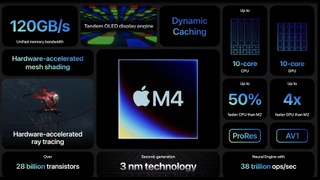An Apple insider has noted that a quartet of new base-level Mac computers, all with at least 16GB of RAM, are being tested. Bloomberg's Mark Gurman says the Macs are currently known by the cryptic model identifiers of "16,1," "16,2," "16,3," and "16,10," and such devices are usually spotted shortly ahead of their launch. Despite growing criticism, Apple has steadfastly sold entry-level Macs with a minimum of 8GB of RAM since 2012.
According to Gurman's report and based on developer test logs he has had eyes on, all the new Macs are M4 Apple Silicon models. That's no surprise, but even the lowest-end base model seen comes with 16GB of RAM on board. Three of the Macs use an M4 chip with 10 CPU cores and 10 GPU cores, and there is a lower-end processor with eight CPU cores and eight GPU cores. According to Gurman, even the lowest-end model is partnered with at least 16GB of RAM. Some also come with 32GB of RAM on board.
Bloomberg's report provides further details, indicating that the 10-core M4 processor mentioned above seems to have the same specs as the one used in the iPad Pro. That means four of the 10 CPU cores are high-performance, and the remaining six are tuned for efficiency. Meanwhile, the octa-core M4 has an even 4/4 split of performance/efficiency cores.

After sharing the M4 chip and RAM quota information, Gurman's report notes that Apple is preparing a smaller Mac Mini, plus new MacBook Pro and iMacs built around M4 chips, for release later this year. We take that as a hint at what model identifiers "16,1," "16,2," "16,3," and "16,10" may refer to.
Estimating the desired RAM quota when purchasing a new Mac is a particularly crucial ordeal, as since Apple Silicon arrived, the system memory chips have been housed on the chip package. This is great for latency and bandwidth and for making a compact computer. Still, it could artificially shorten the service life of an otherwise capable machine, as RAM upgrades have become practically impossible.
Apple has been stingy with its Macs, asking a considerable premium for more R AM (and storage). Moreover, its assertions that "8GB on an M3 MacBook Pro is probably analogous to 16GB on other systems" were primarily ridiculed by PC enthusiasts last year.
PC users may face the same purchase-time RAM quandary with upcoming laptops that don't embrace SO-DIMM or CAMM technologies. We see recently reviewed AMD Ryzen AI 300 series laptops coming with soldered RAM. Moreover, Qualcomm Snapdragon Windows laptops don't have on-package memory but seem to commonly use soldered memory, making later RAM upgrades out of the question for most users.
The upcoming Intel Lunar Lake laptops use on-package RAM, meaning you will be stuck with the working memory quota you decided on at purchase time – just like with Apple. At least the latest Microsoft AI PC guidance appears to push 16GB as a minimum for Windows machines being marketed right n ow, except at the cheapest end.

0 Comments
Post a Comment